

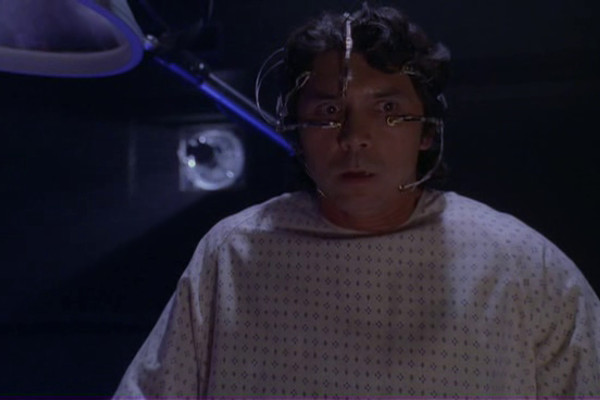
Lou Diamond Phillips stars as a pool cleaner who, eight years before Inception, finds himself trapped in a world of dreams within dreams. It's a strong episode, though does illustrate how out of touch the series could be with the real world around it. Rod Serling's original vision had the series commenting on contemporary concerns, and used the series as metaphor for the human condition. The 2002-2003 series of The Twilight Zone frequently has stories that don't extend towards anything other than the characters that exist within them.
To this end, the natural successor to the original Twilight Zone doesn't seem to be this programme bearing the same title, but Charlie Brooker's anthology series Black Mirror. A decade after this episode aired, a Black Mirror episode with slightly similar themes was screened, entitled White Bear. There the basic premise was used not just to comment on the characters within the story, but on the nature of the need for justice, and the public and media's spectator obsessions with punishment.
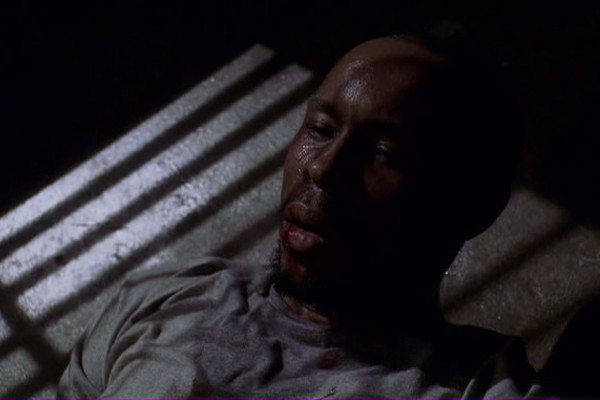
As an illustration of just how lacklustre this version of The Twilight Zone is, one of the greatest TV series ever made - The Wire - was a contemporary of the programme. This is particularly apt here, as, between seasons one and two of the superb Baltimore drama, The Wire's Avon Barksdale (Wood Harris) appears as a rapper plagued by visions of a brutal police interrogation. It speaks to Harris' charisma as a performer that he's able to keep this slight episode engaging, despite the fact that many of the viewers at home were likely ahead of the story long before the final twist arrives.
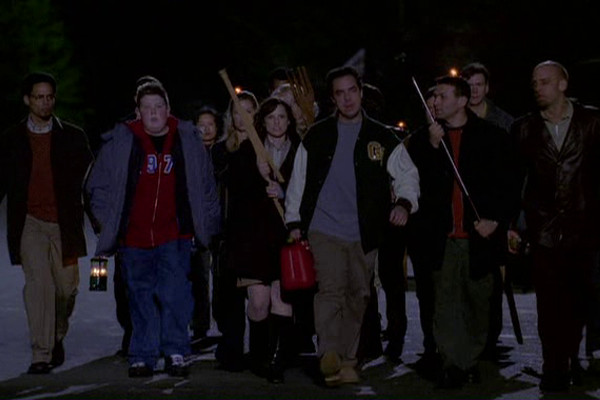
One element of the original series that hasn't aged that well is the number of episodes that feature "flying saucers"... pretty much the same model, a B-movie style flying disc, complete with a rope pulling up the ramp. The original series episode The Monsters Are Due On Maple Street not only ended with such an addition, but could also be preachy in execution. Despite all this, it was one of the most memorable and worthwhile instalments.
Where this adaptation strongly differs is that the residents of Maple Street aren't regular people who grow in suspicions and accusations, but are largely obnoxious caricatures that dislike and distrust each other from the outset. The resolution and target of the message has changed - the army is monitoring the street, not aliens, and the fear is not Communists by metaphor, but post-9/11 terrorists by explicit statement - making it one of the few stories of the season to have relevancy. But it falls down, because we're not watching a group of likeable individuals falling prey to base fears, but a group of people you'd want to avoid just getting slightly worse than they already were before it all started. And, while it's one of the few commendable UPN episodes in that it genuinely has something to say, you do wonder why it bothered to "remake" the original 1960 episode when this update was so different.
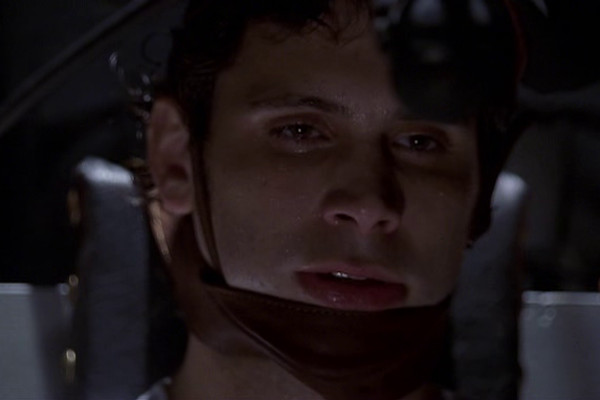
Jeremy Sisto plays Grady Finch, a man sentenced to execution for a murder he swears he did not commit. When he hears an angel's voice saying "not yet" and the methods of his execution fail three times, he believes that he's on a mission from God. Alicia Witt plays his perplexed lawyer in an enticing episode, albeit one that may see the viewers again ahead of the plot when it comes to the various "twists". Purists may be bemused by the use of rock songs in many of these episodes, and this instalment concludes with the track "Getting Away" by Rick Kurek.
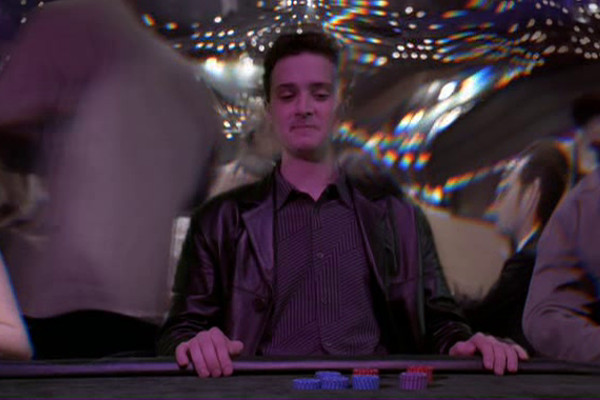
Eddie Kaye Thomas plays a compulsive gambler who is given a special tape recorder by a tramp. When inspecting the tape recorder, Eddie finds that it can turn back time, and uses it to cheat at cards. Such a premise, while not identical, is reminiscent of the original series episode A Kind of Stopwatch (which also bore similarities to the 80s episode A Little Peace and Quiet) where a drunk gave a blowhard a watch that could freeze time. The idea of turning back time to improve on past mistakes is a fun one, and this form of hand-held Groundhog Day makes for an easy watch, if not quite the most groundbreaking episode the series ever did.

Perhaps the nearest thing to an auteur episode this series, as Eriq La Salle writes, directs and stars in an episode of a man diagnosed with a terminal brain tumour. Distraught, he wanders the streets without looking where he's going, and gets hit by a passing car. When he awakes, he finds he's in the past, in a plot that bears similarities to the original series episode Back There. Believing himself to be destined to save Martin Luther King from assassination, such a questionable plot turns out to be a red herring, though to say more would be to spoil the ending. This episode isn't particularly anything groundbreaking, but it's decently put together with some nice lines, and a standout in such a generally below-par series.
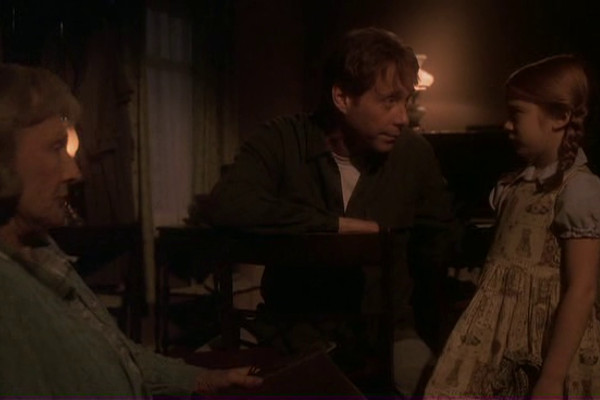
The two revival series largely tended to come up with original material, but to honour the first version of the show, occasionally episodes were remade. The 80s series remade Night of the Meek, Shadow Play, The After Hours and A Game of Pool, and updated Dead Man's Shoes as Dead Woman's Shoes. This 2002/03 series remade, as we've seen, Eye of the Beholder, and adapted The Monsters Are Due on Maple Street, while Dead Man's Eyes is likely a vague update of Dead Man's Shoes.
This particular episode gives us something new... it takes the original series episode (which was also, along with two other original series stories, adapted into the 1983 Twilight Zone movie) and gives us a sequel to it. Billy Mumy reprises his role as Anthony, and Cloris Leachman returns as his mother. Of the rest of the original episode's cast, then they'd either retired or died, except for Jeanne Bates, who played Ethel Hollis, and was in an episode of That 70s Show the year before this aired.
This sequel gives us a daughter for Anthony, played by his own real-life daughter, a girl who shares his powers. Although the ending sees a lot of the 60s mayhem "put right", there's still an air of menace underneath, and we never get to discover who the girl's mother was, or what happened to her...
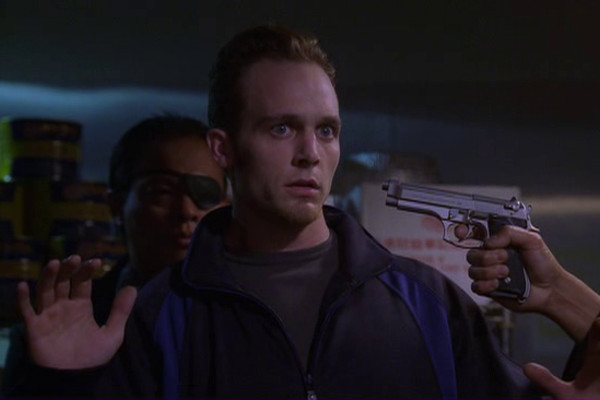
An intensely intriguing episode, as hospital orderly Zack Walker (Ethan Embry) experiences a series of blackouts, after which he's unknowingly become involved in some criminal activity. Buying a gun and plotting an assassination against his own will, he finds himself in a race against time to prevent his murderous actions, and to find out exactly what's going on.